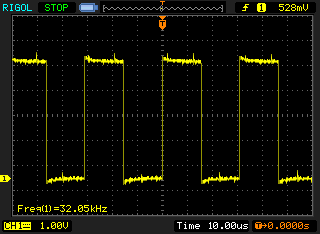Maxim DS1077 EconOscillator/Divider Library
Maxim DS1077 EconOscillator/Divider
This class wraps the functions of the DS1077 oscillator into a usable class for mBed. The oscillator uses I2C to communicate with the host MCU. This oscillator output a square wave, so if you're looking for a sine wave - this isn't it.
Be sure to download the DATASHEET (You'll need it to work with this chip). You can also purchase a breakout board from SparkFun. Be sure to ground the CTRL1 and CTRL0 pins if you don't plan on using them.
This library was created using the mbed NXP LPC11U24. Pins p27 and p28 were used for the I2C functions. Be sure to install 1K pull-up resistors on both lines.
Here's the output from the OUT1 pin on my scope after running the sample code below:

Below is some sample code that sets the oscillator OUT2 pin to 16.67MHz and the OUT1 pin to 32kHz. It then outputs the content of all the control registers. You'll need the serial debug setup for your mBed. If you still need the serial driver for your mbed, you can get it here.
Sample Code
#include "mbed.h"
#include "DS1077.h"
I2C i2c(p28, p27); // sda, scl
// Comment out all of the references to 'pc' on this page if you don't have the
// serial debug driver for your mbed board installed on your computer. If you do,
// I personally like to use Putty as the terminal window to capture debug messages.
Serial pc(USBTX, USBRX); // tx, rx
// Again, remove the '&pc' parameter if you're not debugging.
DS1077 osc(&i2c, &pc);
DigitalOut myled(LED1);
int main()
{
pc.printf("** DS1077 EconOscillator **\r\n");
osc.setSelect();
wait_ms(1);
// Set OUT2 to ~16.67MHz
osc.setPrescalerP0Divisor(DS1077::X8);
wait_ms(1);
// Set OUT1 to ~32kHz
osc.setPrescalerP1Divisor(DS1077::X4);
wait_ms(1);
osc.setDivisor(0xFFF);
wait_ms(1);
pc.printf("DIV: 0x%X\r\n", osc.divRegister()&0x0000FFFF);
wait_ms(1);
pc.printf("MUX: 0x%X\r\n", osc.muxRegister()&0x0000FFFF);
wait_ms(1);
pc.printf("BUS: 0x%X\r\n", osc.busRegister());
// osc.write();
while(1) {
myled = 1;
wait(0.2);
myled = 0;
wait(0.2);
}
}
 Michael Lange
Michael Lange